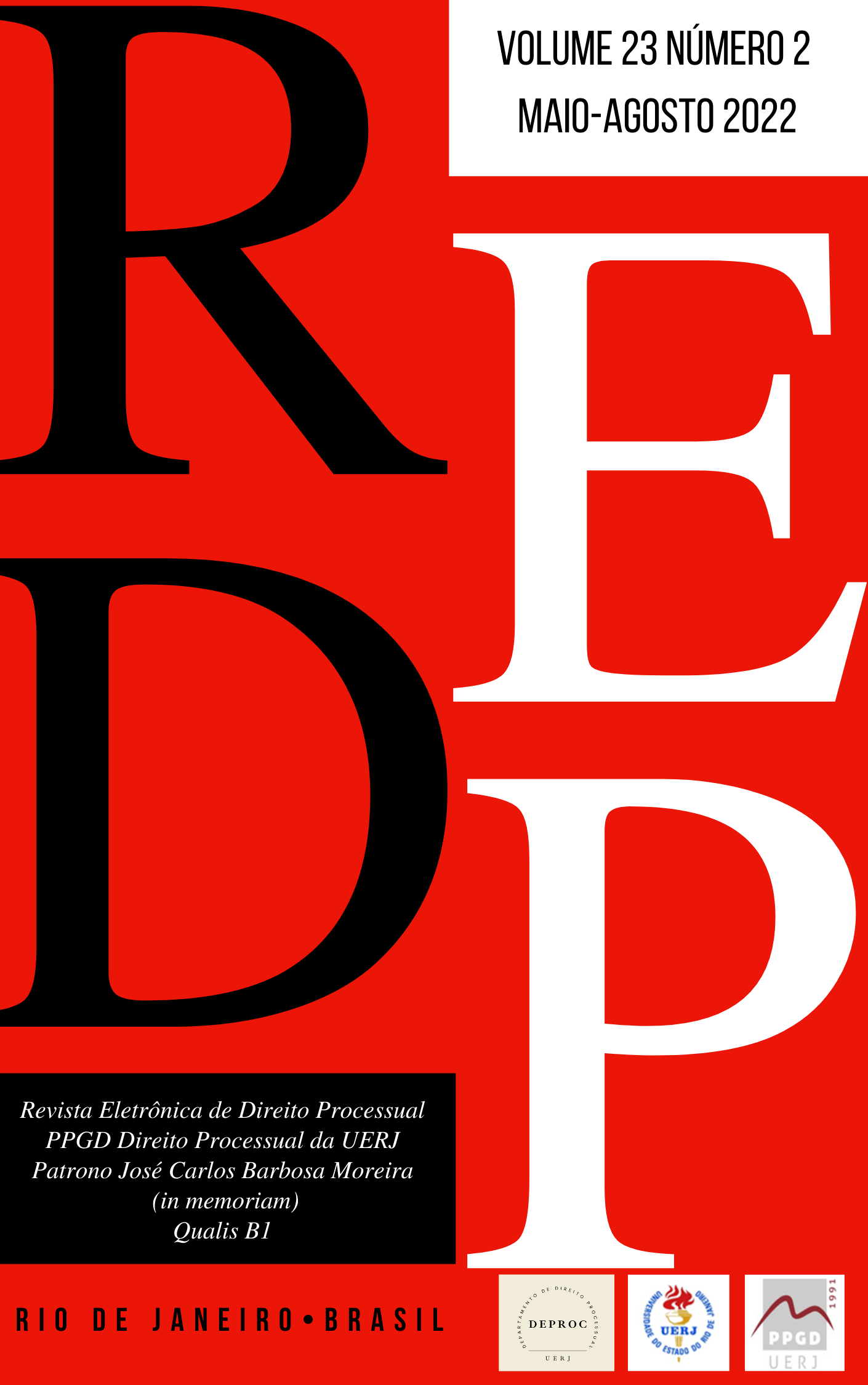THE RIGHT TO THE PROCESS DURATION IN A REASONABLE TIME BY THE LIGHT OF THE COOPERATIVE PROCESSUAL PATTERN
DOI:
https://doi.org/10.12957/redp.2022.58218Keywords:
Reasonable duration of the process, duty of cooperation, procedural managementAbstract
Timely jurisdictional provision is a concern present in legal systems around the world, due to the excessive and unjustified prolongation of the process, generating uncertainty, dissatisfaction and discredit in the jurisdictional activity itself. The study brings an analysis with emphasis on the Brazilian and Portuguese legal systems on the reasonable duration of the process for resolving the dispute and the effectiveness of judicial decisions, with emphasis on the principle of procedural cooperation of procedural subjects and for the power/duty of procedural management by the judge. The hypotheses of the scientific work will be investigated through bibliographic and documentary research. According to the use of the results, the research is applied or practical, as it aims to solve the problem pointed out from the knowledge of the researcher. And, depending on the approach or nature of the method, it will be qualitative, as it establishes a dynamic relationship between the real world and the subject. The deductive method will be used, since it will start from studies and general analyzes on the procedural timeliness, based on the cooperative model of process and the power/duty of procedural management by the judge, both in Brazil and in Portugal. As for the objectives, the research will be exploratory, since it was developed with the objective of providing an overview of the exposed problem and also explanatory, as it aims to clarify which factors contribute to the difficulties faced for the effective jurisdictional provision. The study has as general objective to analyze the duration of the process in the Portuguese and Brazilian judicial system and as specific objectives, to verify, in practice, the effectiveness of the jurisdictional provision, taking into account the cooperative model of process and the power/duty of management by the judge, in order to contribute to the timeliness of the process. It is expected, therefore, at the end of the study, to find answers to the difficulties encountered in the effectiveness of the jurisdictional provision and to point out possible solutions to the problem of procedural delays. In conclusion, it is possible to affirm that the incessant search for greater speed in the processing and judgment of cases is a concern of reforms in procedural legislation, both in Brazil and in Portugal, but, despite this, the reasonable duration of the process depends on the specific case. and factors such as the complexity of the case, the behavior of the parties, the performance of Organs courts, the circumstances of the case and the time required for it to mature. The excessive duration of the process can also be associated with structural problems of the Judiciary, the judge's not always active posture, excessive attachment to procedural forms, resistance to mechanisms of adequacy and flexibility of procedural acts, to the behavior of other subjects, to the culture of polarized litigation, the abuse of rights, the low adherence to extrajudicial means of composition and their high costs and the lack of constant qualification of legal operators.Downloads
Published
How to Cite
Issue
Section
License
Todos os artigos publicados na Revista Eletrônica de Direito Processual (REDP) (Departamento de Direito Processual, Universidade do Estado do Rio de Janeiro, Brasil) são licenciados por meio de uma Licença Creative Commons - Atribuição 4.0 Internacional (CC BY 4.0).
Os autores retêm os direitos autorais de seu artigo e concordam em licenciar seu trabalho com a licença CC BY 4.0, aceitando assim os termos e condições específicos desta licença disponíveis no seguinte website: https://creativecommons.org/licenses/by/4.0/legalcode.
- Os autores concedem à REDP o direito de primeira publicação, de se identificar como publicadora original do trabalho e concedem à revista uma licença de direitos não exclusivos para utilizar o trabalho das seguintes formas: Reproduzir, vender e distribuir cópias eletrônicas ou impressas do manuscrito como um todo, de partes específicas do manuscrito e de suas traduções para qualquer idioma;
- O uso do artigo por terceiros é livre, contanto que a integridade da publicação seja mantida e seus autores originais, periódico de primeira publicação e detalhes de citação sejam identificados.
Dentro dos termos da licença, os autores podem entrar em acordos contratuais adicionais separados para a distribuição não exclusiva da versão publicada do trabalho na revista.
Copyright and Licensing
All articles published in the Procedural Law Electronic Review (REDP) (Department of Procedural Law, State University of Rio de Janeiro, Brazil) are licensed under a Creative Commons License - Attribution 4.0 International (CC BY 4.0).
- Authors retain copyright to their article and agree to license their work under the CC BY 4.0 license, thereby accepting the specific terms and conditions of this license available at the following website: https://creativecommons.org/licenses/by/4.0/ legal code.
- Authors grant REDP the right of first publication, to identify itself as the original publisher of the work, and grant the journal a non-exclusive license to use the work in the following ways: Reproduce, sell and distribute electronic or printed copies of the manuscript as a whole, of specific parts of the manuscript and its translations into any language;
- Use of the article by third parties is free, as long as the integrity of the publication is maintained and its original authors, first publication journal, and citation details are identified.
Within the terms of the license, authors may enter into separate additional contractual agreements for the non-exclusive distribution of the published version of the work in the journal.





